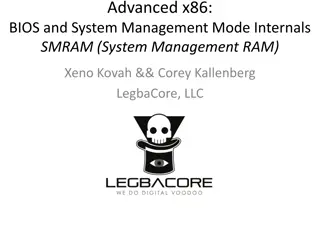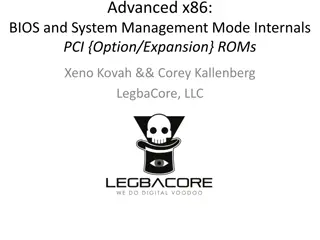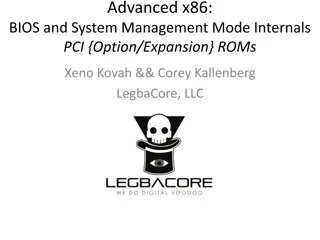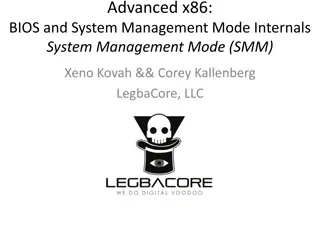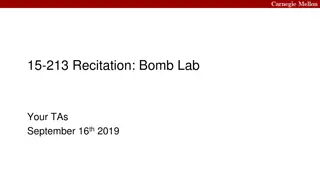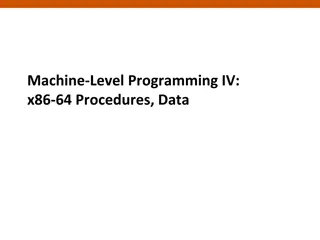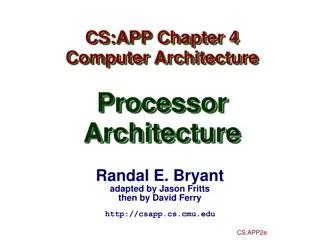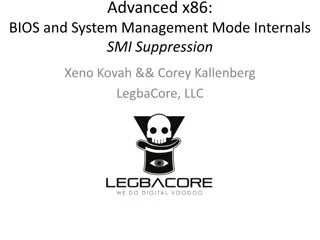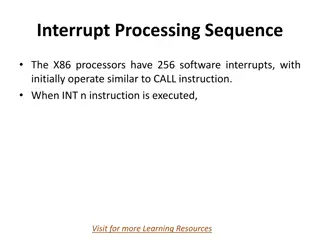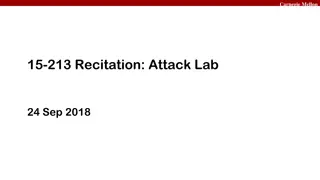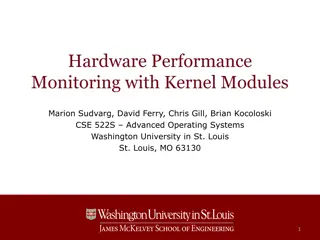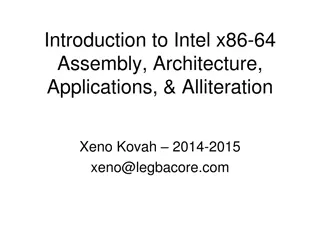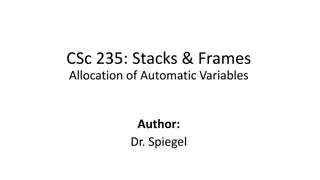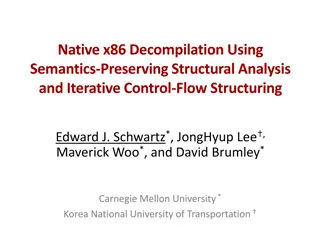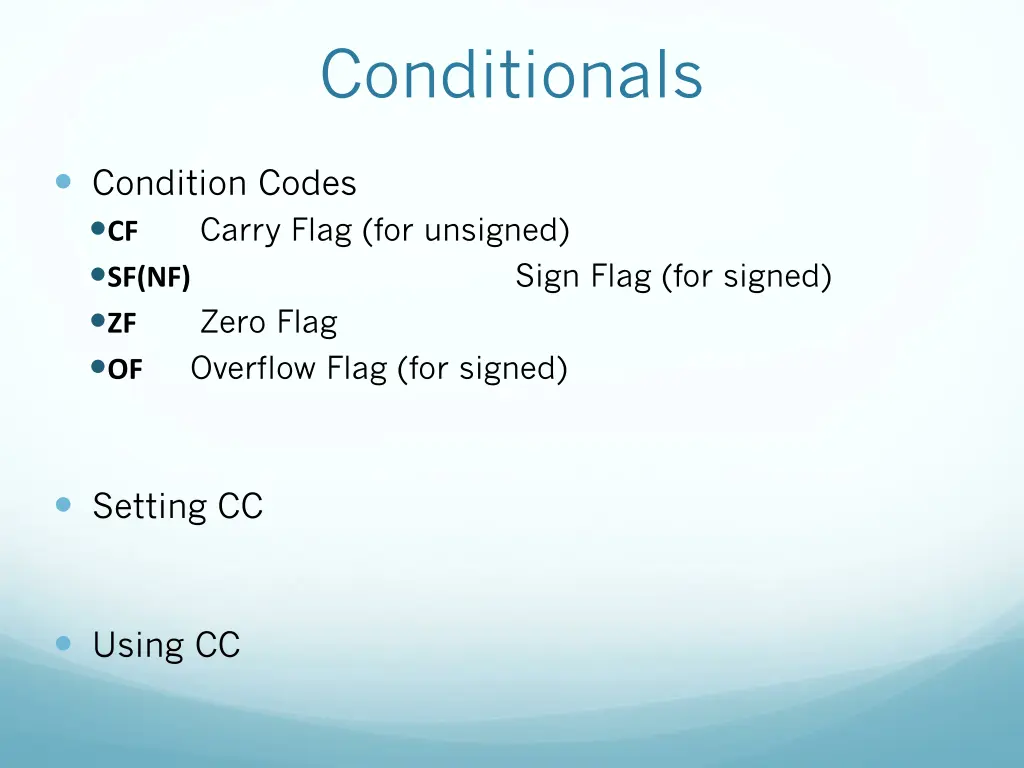
Understanding Condition Codes in Processor State and Setting Examples
Explore the significance of condition codes like CF, ZF, SF, and OF in processor state, their implicit and explicit settings through arithmetic operations such as add, compare, and logical tests. Enhance your understanding of how condition codes impact program execution and decision-making in microprocessor architectures.
Download Presentation

Please find below an Image/Link to download the presentation.
The content on the website is provided AS IS for your information and personal use only. It may not be sold, licensed, or shared on other websites without obtaining consent from the author. If you encounter any issues during the download, it is possible that the publisher has removed the file from their server.
You are allowed to download the files provided on this website for personal or commercial use, subject to the condition that they are used lawfully. All files are the property of their respective owners.
The content on the website is provided AS IS for your information and personal use only. It may not be sold, licensed, or shared on other websites without obtaining consent from the author.
E N D
Presentation Transcript
Conditionals Condition Codes CF Carry Flag (for unsigned) SF(NF) ZF Zero Flag OF Overflow Flag (for signed) Sign Flag (for signed) Setting CC Using CC
Processor State Information about currently executing program Temporary data ( %rax, ) Location of runtime stack ( %rsp ) Location of current code control point ( %rip, ) Status of recent tests ( CF, ZF, SF, OF ) Registers %rax %rbx %rcx %rdx %rsi %rdi %r8 %r9 %r10 %r11 %r12 %r13 %r14 %r15 %rsp %rbp Instruction pointer %rip Condition codes CF ZF SF OF
Condition Codes (Implicit Setting) Implicitly set (think of it as side effect) by arithmetic operations Example: addqSrc,Destt = a+b ZF set if t == 0 SF set if t < 0 (as signed) CF set if carry out from most significant bit (unsigned overflow) OF setif 2 s-complement (signed) overflow (a>0 && b>0 && t<0) || (a<0 && b<0 && t>=0) Not set by leaq instruction
Condition Codes (Explicit Setting) cmpqSrc2, Src1: Set Conditions by Arithmetic Compare cmpq b,a like computing a-b without setting destination subq src2, src1 : src1 = src1-src2; CF(src1) Cmpq src2, src1 : CF(src1-src2) ZF set if a == b SF set if (a-b) < 0 (as signed) CF set if carry out from most significant bit (used for unsigned comparisons) OF setif two s-complement (signed) overflow (a>0 && b<0 && (a-b)<0) || (a<0 && b>0 && (a-b)>0)
Condition Codes (Explicit Setting) testqSrc2, Src1: Set Conditions by Logical Test testq b,a like computing a&b without setting destination subq src2, src1 : src1 = src1&src2; CF(src1) cmpq src2, src1 : CF(src1&src2) Sets condition codes based on value of Src1 & Src2 Typical use case: one operand is a mask ZF set when a&b == 0 SF set when a&b < 0
Reading Condition Codes setX instructions Set low-order byte of destination to 0 or 1 based on combinations of condition codes Does not alter remaining 7 bytes SetX sete setne sets setns setg setge setl setle seta setb Condition ZF ~ZF SF ~SF ~(SF^OF)&~ZF ~(SF^OF) (SF^OF) (SF^OF)|ZF ~CF&~ZF CF Description Equal / Zero Not Equal / Not Zero Negative Nonnegative Greater (Signed) Greater or Equal (Signed) Less (Signed) Less or Equal (Signed) Above (unsigned) Below (unsigned)
Reading Condition Codes setX instructions: Set single byte single byte based on combination of condition codes Uses one of the byte registers (%al, %ah, %bl, ) Does not alter remaining bytes in the extended register Typically use movzbl to finish job 32-bit instructions also set upper 32 bits to 0 int gt (long x, long y) { return x > y; } Register Use(s) %rdi Argument x %rsi Argument y %rax Return value cmpq setg movzbl %al, %rax ret %rsi, %rdi # Compare x and y (x-y) %al # Set %al when x > y # Zero rest of %rax
Jumping jX Instructions Jump to different part of code depending on condition codes jX Condition Description jmp je jne js jns jg jge jl jle ja jb Unconditional ZF ~ZF SF ~SF ~(SF^OF)&~ZF ~(SF^OF) (SF^OF) (SF^OF)|ZF ~CF&~ZF CF Equal / Zero Not Equal / Not Zero Negative Nonnegative Greater (Signed) Greater or Equal (Signed) Less (Signed) Less or Equal (Signed) Above (unsigned) Below (unsigned)
Conditional Branch Conditional Branch int max(int x, int y) { if (x > y) return x; else return y; } if (t) then-statement; else else-statement; t = test_expr; if (!t) goto false; do then-statement; goto done; false: do else-statement; done: int goto_max(int x, int y) { int rval = y; int ok = (x <= y); if (ok) goto done; rval = x; done: return rval; }
Carnegie Mellon Expressing with Goto Code C allows goto statement Jump to position designated by label long absdiff_j(long x, long y) { long result; CMP(x, y); if (LT) goto Else; result = x-y; return result; Else: result = y-x; return result; } long absdiff(long x, long y) { long result; if (x > y) { result = x-y; return result; } else { result = y-x; return result; } }
Carnegie Mellon Conditional Branch Example Generation -- on mercury.cs.uml.edu > gcc Og -S control.c absdiff: # %rdi = x; %rsi = y cmpq %rsi, %rdi # x:y jle .L4 movq %rdi, %rax subq %rsi, %rax ret .L4: # x <= y movq %rsi, %rax subq %rdi, %rax ret long absdiff_j(long x, long y) { long result; CMP(x, y); if (LT) goto Else; result = x-y; return result; Else: result = y-x; return result; } Register Use(s) %rdi Argument x %rsi Argument y %rax Return value
Carnegie Mellon x86 vs. MIPS In C: if (x > y) In pseudo-C: if (x <= y) goto else Fake MIPS with x86 registers absdiff: # %rdi = x; %rsi = y # ble x<=y, else ble %rdi, %rsi, else x86 absdiff: # %rdi = x; %rsi = y # cmpq cmpq %rsi, %rdi #<= jle .L4 # if (%rdi <= %rsi) (x-y) movq %rdi, %rax subq %rsi, %rax ret .L4: # x <= y movq %rsi, %rax subq %rdi, %rax ret y, x (x <= y) sub %rax, %rax,%rsi ret else: # x <= y move %rax, %rsi sub %rax, %rax, %rdi ret # if (%rdi <= %rsi) move %rax, %rdi
Carnegie Mellon General Conditional Expression Translation (Using Branches) C Code val = Test ? Then_Expr : Else_Expr; val = x>y ? x-y : y-x; Goto Version ntest = !Test; if (ntest) goto Else; val = Then_Expr; goto Done; Else: val = Else_Expr; Done: . . . Create separate code regions for then & else expressions Execute appropriate one
Carnegie Mellon Using Conditional Moves Conditional Move Instructions Instruction supports: if (Test) Dest Src Supported in post-1995 x86 processors GCC tries to use them But only when known to be safe C Code val = Test ? Then_Expr : Else_Expr; Goto Version Why? Branches are very disruptive to instruction flow through pipelines Conditional moves do not require control transfer result = Then_Expr; eval = Else_Expr; nt = !Test; if (nt) result = eval; return result;
Carnegie Mellon Conditional Move Example long absdiff(long x, long y) { long result; if (x > y) result = x-y; else result = y-x; return result; } long absdiff (long x, long y) { long result; result = x>y ? x-y : y-x; return result; } absdiff: # x = rdi, y = rsi movq %rdi, %rax subq %rsi, %rax movq %rsi, %rdx subq %rdi, %rdx cmpq %rsi, %rdi cmovle %rdx, %rax ret # rax = x # result = x-y # rdx = y # eval = y-x # x:y # if x<=y, result = rdx
Carnegie Mellon Bad Cases for Conditional Move Expensive Computations val = Test(x) ? Hard1(x) : Hard2(x); Both values get computed Only makes sense when computations are very simple Risky Computations val = p ? *p : 0; Both values get computed May have undesirable effects May have undesirable effects Computations with side effects val = x > 0 ? x*=7 : x+=3; Both values get computed Must be side Must be side- -effect free effect free
Carnegie Mellon Loops Goto Version loop: Body Body if (Test goto loop Do while do Body Body while (Test Test) Test); long pcount_goto (unsigned long x) { long result = 0; loop: result += x & 0x1; x >>= 1; if(x) goto loop; return result; } movl $0, %eax # result = 0 #loop: .L2: movq andl addq shrq jne ret %rdi, %rdx $1, %edx %rdx, %rax %rdi .L2 # t = x & 0x1 # result += t # x >>= 1 # if (x) goto loop
Carnegie Mellon Loops While while (Test Body Body Goto Version goto test; loop: Body Body test: if (Test goto loop; done: Test) Jump-to-middle translation Used with -Og Test) loop: if (!Test)goto done; Body goto loop; done: Do-while conversion Used with O1
Carnegie Mellon For Loop While Loop For Version For Version for (Init Init; Test Test; Update Update) Body Body While Version While Version Init; loop: if (!Test done; Body Body Update; Update; goto loop; done: Init Init; while (Test Test ) { Test)goto Body Body Update Update; }
Carnegie Mellon Switch Statement long switch_eg (long x, long y, long z) { long w = 1; switch(x) { case 1: w = y*z; break; case 2: w = y/z; /* Fall Through */ case 3: w += z; break; case 5: case 6: w -= z; break; default: w = 2; } return w; } Multiple case labels Here: 5 & 6 Fall through cases Here: 2 Missing cases Here: 4
Carnegie Mellon Jump Table Structure Jump Targets Jump Table Switch Form Targ0: switch(x) { case val_0: Block Block 0 case val_1: Block Block 1 case val_n n-1: Block Blockn n 1 } JTab: Code Block 0 Targ0 Targ1 Targ2 Targ1: Code Block 1 Targ2: Code Block 2 Targn n-1 Translation (Extended C) goto *JTab[x]; goto Targ0 goto Targ1 Targn n-1: Code Block n n 1
Carnegie Mellon Switch Statement Example long switch_eg(long x, long y, long z) { long w = 1; switch(x) { . . . } return w; } Jump table .section .align 8 .L4: .quad .quad .quad .quad .quad .quad .quad .rodata .L8 # x = 0 .L3 # x = 1 .L5 # x = 2 .L9 # x = 3 .L8 # x = 4 .L7 # x = 5 .L7 # x = 6 Setup: switch_eg: movq cmpq ja jmp %rdx, %rcx $6, %rdi # x:6 .L8 # Use default *.L4(,%rdi,8) # goto *JTab[x] Indirect Indirect jump jump
Carnegie Mellon Switch Statement Example long switch_eg(long x, long y, long z) { long w = 1; switch(x) { . . . } return w; } Register %rdi Use(s) Argument x %rsi Argument y %rdx Argument z %rax Return value Setup: switch_eg: movq cmpq ja jmp %rdx, %rcx $6, %rdi # x:6 .L8 *.L4(,%rdi,8) What range of values What range of values take the default take the default jump? jump?
Carnegie Mellon Assembly Setup Explanation Jump table Table Structure Each target requires 8 bytes Base address at .L4 .section .align 8 .L4: .quad .quad .quad .quad .quad .quad .quad .rodata .L8 # x = 0 .L3 # x = 1 .L5 # x = 2 .L9 # x = 3 .L8 # x = 4 .L7 # x = 5 .L7 # x = 6 Jumping Direct:jmp .L8 Jump exit is denoted by label .L8 Indirect:jmp *.L4(,%rdi,8) Start of jump table: .L4 Must scale by factor of 8 (addresses are 8 bytes) Fetch target from effective Address .L4 + x*8 Only for 0 x 6
Carnegie Mellon Jump Table Jump table switch(x) { case 1: // .L3 w = y*z; break; case 2: // .L5 w = y/z; /* Fall Through */ case 3: // .L9 w += z; break; case 5: case 6: // .L7 w -= z; break; default: // .L8 w = 2; } .section .rodata .align 8 .L4: .quad .L8 # x = 0 .quad .L3 # x = 1 .quad .L5 # x = 2 .quad .L9 # x = 3 .quad .L8 # x = 4 .quad .L7 # x = 5 .quad .L7 # x = 6
Carnegie Mellon Code Blocks (x == 1) switch(x) { case 1: w = y*z; break; . . . } .L3: // .L3 movq imulq ret %rsi, %rax %rdx, %rax # y # y*z Register Use(s) %rdi Argument x %rsi Argument y %rdx Argument z %rax Return value
Carnegie Mellon Handling Fall-Through long w = 1; . . . switch(x) { . . . case 2: w = y/z; /* Fall Through */ case 3: w += z; break; . . . } case 2: w = y/z; goto merge; case 3: w = 1; merge: w += z;
Carnegie Mellon Code Blocks (x == 2, x == 3) .L5: # Case 2 movq %rsi, %rax cqto idivq %rcx jmp .L6 # goto merge .L9: # Case 3 movl $1, %eax .L6: # merge: addq %rcx, %rax # w += z ret long w = 1; . . . switch(x) { . . . case 2: w = y/z; /* Fall Through */ case 3: w += z; break; . . . } # y/z # w = 1 Register Use(s) %rdi Argument x %rsi Argument y %rcx Argument z %rax Return value
Carnegie Mellon Code Blocks (x == 5, x == 6, default) switch(x) { . . . case 5: // .L7 case 6: // .L7 w -= z; break; default: // .L8 w = 2; } .L7: # Case 5,6 movl $1, %eax subq %rcx, %rax # w -= z ret .L8: # Default: movl $2, %eax ret # w = 1 # 2 Register Use(s) %rdi Argument x %rsi Argument y %rcx Argument z %rax Return value
Carnegie Mellon Summary C Control if-then-else do-while while, for switch Assembler Control Conditional jump Conditional move Indirect jump (via jump tables) Standard Techniques Loops converted to do-while or jump-to-middle form Large switch statements use jump tables Sparse switch statements may use decision trees (if-elseif- elseif-else)


